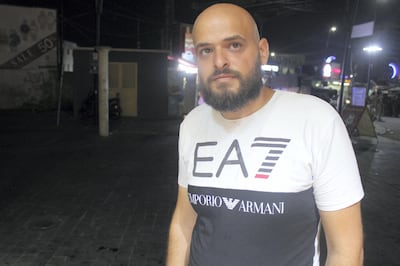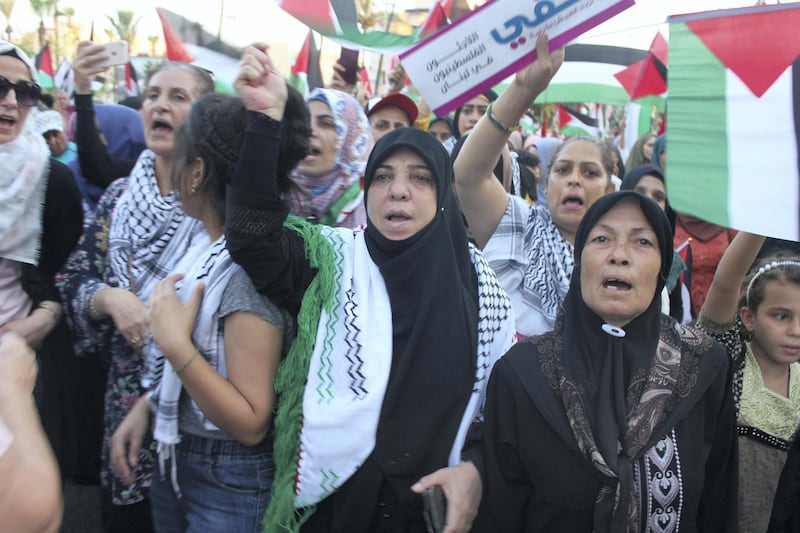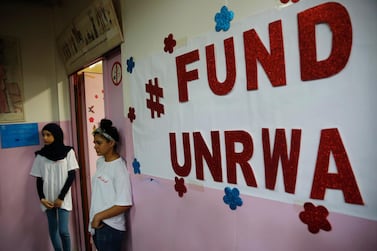Protests over labour conditions for Palestinians in Lebanon are spreading from refugee camps into city streets as frustration grows over curbs on their civil rights.
Thousands of Palestinians and Lebanese marched in the southern city of Saida on Tuesday to demand the reversal of a Ministry of Labour crackdown on foreign workers without permits.
“Palestinians have been working and earning and spending money in this country for the past 70 years,” said Mohammed Hussein Youssef, 30, a red keffiyeh scarf around his neck and sweat on his brow. “We don’t present a threat to the economy – we contribute to it like any Lebanese. We love this country more than some Lebanese themselves. We just want to feel like humans, nothing more.”
Mr Youssef, who runs a plastic and metal sorting workshop in Ein El Hilweh, is among the thousands of Palestinians attending largely peaceful protests across Lebanon against the Ministry of Labour’s self-described campaign against “illegal foreign labour.”
Most demonstrations have taken place in Palestinian refugee camps, but the Saida protest – marshalled by local Lebanese MP Osama Saad – marked a significant move into Lebanese-majority areas. A sit-in also took place outside the Ministry of Labour building in Beirut on Monday.
According to activists, the demonstrations – and the will behind them – may form the basis of a wider movement to demand Palestinians’ rights, although the chances of them being granted remain slim for now.
Palestinian refugees have lived in Lebanon for 71 years since fleeing Palestine in 1948 after the creation of Israel, and many have never left the country. But they are still considered as foreigners when it comes to Lebanese labour law, and say that the crackdown discriminates against them.
As well as the labour restrictions, Palestinians in Lebanon have no defined legal status, and aren’t allowed to own property, or vote or stand in elections. While some live in cities among Lebanese populations, many are crammed into impoverished, overcrowded conditions in 12 official refugee camps. Many Palestinians see the clampdown as part of wider, systematic discrimination against them in Lebanon.
“There’s been a racist attack on Palestinians for ages, and we’re living under siege, in the shadow of walls and barriers, with so many mental pressures,” added Mr Youssef, shouting to make himself heard over loud dabke music blasting from loudspeakers at the Saida protest.
The current Ministry of Labour plan has shone light on Palestinians’ unclear legal status.
Because Palestinians are treated as foreigners in Lebanon, employers must obtain work permits for them. That obliges the businesses to make 23.5 per cent social security payments to the government. But researchers say employers often specifically hire Palestinians to avoid these charges, and to pay low salaries that Lebanese workers would not accept, forcing Palestinians to work without permits.
A Ministry of Labour statement issued on Thursday said that authorities have introduced several measures to make it easier for Palestinians to obtain work permits.
There are exemptions from “the requirement to register the worker with insurance” and from, “obtaining public notary certification” [for the employee], the statement read.
Statistics are hard to come by, but in 2014 the International Labour Organisation was reported as saying that the number of Palestinian refugees in Lebanon holding a work permit was “very low”.
Yet Palestinians say they do not want the Ministry of Labour to make exceptions for them, and don’t want to be treated as foreigners when it comes to labour law in the first place.
“Mate, we’ve been here for 71 years, why do we need exceptions?” said 30-year-old Ahmed Al Achkar, an activist from Ein El Hilweh camp, speaking as if to address the Minister of Labour. “They say they are applying the law, but the baseline is racist.”
Since the beginning of the Ministry of Labour crackdown on July 10, Palestinian refugees have reportedly been fired by Lebanese employers who don't want to take on the cost and responsibility of obtaining foreigners' work permits for them. The Union of Palestinian Syndicates in Lebanon didn't respond to a request for specific figures, but interviewees The National spoke to said dozens of Palestinians had been forced to leave their jobs.

Work permit or no work permit, Palestinians are also using the current crackdown to speak up about the restrictions that ban them from dozens of jobs entirely, such as engineering, medicine, and law. They are also kicking back against a ban on property ownership and curbs on bringing construction materials into the refugee camps to build or repair homes.
Some Palestinians believe such measures are meant to erase them from the fabric of Lebanese society.
"At the camp's entrance, it is forbidden to bring in construction materials used to build homes,” said 22-year-old Jamal Al Muqdah, an elevator electrician from Ein El Hilweh. “It makes one wonder what's behind this. They don't want families to multiply, to prevent procreation and family multiplication. It's as if they've made the decision for us.”
Estimates on the Palestinian population in Lebanon vary wildly. A 2017 census by the Lebanese Palestinian Dialogue Committee estimated it at 174,000, while UNRWA, the UN agency for Palestinian refugees, puts the figure at 450,000.
Responses to the labour law issue have quickly become politicised. Over the past fortnight meetings have taken place between the Minister of Labour Camille Abu Sleiman and Palestinian representatives, but also between Prime Minister Saad Hariri and Palestinian politicians. Parliamentary Speaker Nabih Berri has stepped in to condemn the crackdown.
But many Palestinians say they don’t trust any of the leaders supposedly representing their interests before Lebanese leaders, and they need a more unified voice in front of politicians, according to activists.
"Palestinians now need to good communication and more leadership," Manal Kortam, a Palestinian-Lebanese political activist, told The National. "They don't need more leadership on the ground level – they have that – but at the level of communication with decision-makers."
The protests have also reminded of continued internal tensions in the Palestinian community. On Friday, a man was shot dead in Ein El Hilweh camp following a dispute with the family of Bilal Al Arqoub, a renowned Islamist in the camp.
A masked gunman opened fire on Hussein Alaaeddine and he died from his wounds shortly afterwards in an incident reported to be motivated by revenge for an attack by his brother against Mr Al Arqoub’s son in March.
An increased presence of armed factional militias on the streets of Ein El Hilweh was a deliberate attempt to undermine a "people's movement" demanding full labour rights for Palestinians, a source in the camp told The National.
While the issue has highlighted Palestinians’ limited access to jobs in Lebanon, it has also shed light on wider discrimination against them, and poor living conditions.
In Burj Al Barajneh refugee camp in Beirut’s southern suburbs, storeys of buildings seem to teeter precariously, the gaps between them sometimes so narrow that daylight doesn’t penetrate. Homes remain shrouded in darkness, and poor plumbing means dirty water trickles through the camp’s narrow alleyways.
“The environmental conditions in all the camps are horrible,” said Dima Zayat, deputy country director at Anera, an international non-profit organization working with Palestinian and Syrian refugees, and Lebanese host communities. “You cannot provide a decent life for your family in any of them, unfortunately. These living conditions affect Palestinians’ mental and physical health.”
She says the government should have started a dialogue before enforcing the law “without preparations”.
Anera partners with grassroots associations to provide training for around 1,500 Palestinians a year in Lebanon. In a Burj Al Barajneh classroom this week, a group of 14-26 year old boys and young men took part in a six-month-long course on electricity repairs and installations.
“Some of these boys are those who don’t go to school – but they want to learn so they can get jobs,” explained instructor Saer Ibrik, an electrician himself.
“Some of them struggle at first, but I deal with them like a comrade and not like a teacher, to help them like the work. I feel so happy when I see them achieving – and three of the boys who did this course now work with me as electricians."
Observers see the ongoing protests as part of increasing awareness among Palestinians in Lebanon over their lack of rights.
"These protests have made a difference by telling the world that we want rights to work, to live, to breathe, to own, to marry in Lebanon," Anis Mohsen, co-founder of the Palestinian Human Rights Organization, a Lebanon-based NGO, told The National. "That, or we want to go back to Palestine, or be taken to any other country that will give us our rights, to have an adequate life."
It's not clear how much the demonstrations will sway Lebanese politicians' will to change the laws in Palestinians' favour. But back in Saida, Ahmed Al-Achkar is adamant that his community will continue to protest.
“We won’t accept living like slaves here,” he says.
He mulls over not having any clear status, at not being able to own property or choose the job he’d like to have, at not being defined.
There’s a long silence.






